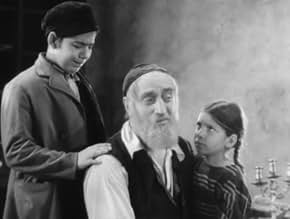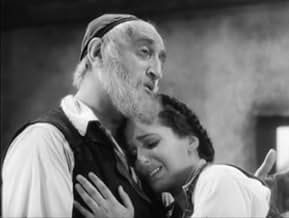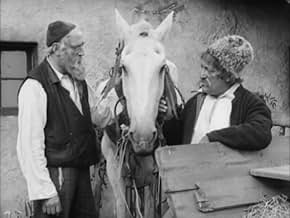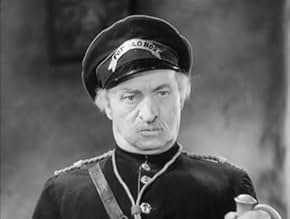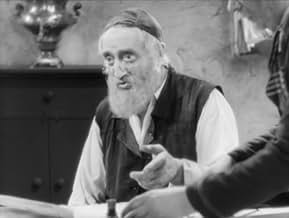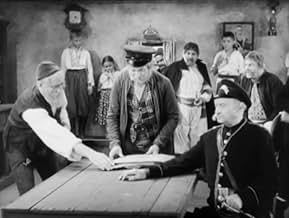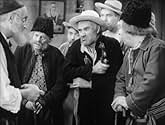The original, non-musical film version of the book which inspired "Fiddler on the Roof".The original, non-musical film version of the book which inspired "Fiddler on the Roof".The original, non-musical film version of the book which inspired "Fiddler on the Roof".
- Director
- Writers
- Stars
- Awards
- 1 win total
- Director
- Writers
- All cast & crew
- Production, box office & more at IMDbPro
Featured reviews
If you watch "Tevya", you might be surprised to learn that it was filmed at the old Biograph Studio in Manhattan...though I suspect that many of the outdoor scenes were filmed in far off Long Island or other New York boroughs, as I cannot imagine that there were places in Manhattan that could double as farm land. It's also surprising because the film is made entirely in Yiddish! It might surprise you to know that many Yiddish films were made in the States for consumption by Jewish audiences around the world.
The story is essentially the same as "Fiddler on the Roof" by Sholom Aleichem... but without the music, singing or expensive sets. It also runs only about 90 minutes...as opposed to double the length for the Hollywood musical.
The story finds Tevya seeing the worst of life, as his youngest daughter defies him to go off to marry a Gentile. Essentially, she is now dead to her family. To make matters worse, her mother soon dies and Tevya and the remaining family members are ordered off the land...the result of yet another Russian pogrom.
The story is not pleasant, but how could you tell the Russian Jewish experience of the 19th century without much sadness and persecution? I see it less as a fun film (it certainly ISN'T), but an important one as it documents a lost way of life...and fits in well with other stories such as "America, America" and "Roots".
Overall, while not pleasant it's very well made and the acting by director/screenwriter Maurice Schwartz is a standout. For those who find "Fiddler on the Roof" overlong and ponderous (I know there aren't many...but I found the film too long and slow), it's a decent alternative.
The story is essentially the same as "Fiddler on the Roof" by Sholom Aleichem... but without the music, singing or expensive sets. It also runs only about 90 minutes...as opposed to double the length for the Hollywood musical.
The story finds Tevya seeing the worst of life, as his youngest daughter defies him to go off to marry a Gentile. Essentially, she is now dead to her family. To make matters worse, her mother soon dies and Tevya and the remaining family members are ordered off the land...the result of yet another Russian pogrom.
The story is not pleasant, but how could you tell the Russian Jewish experience of the 19th century without much sadness and persecution? I see it less as a fun film (it certainly ISN'T), but an important one as it documents a lost way of life...and fits in well with other stories such as "America, America" and "Roots".
Overall, while not pleasant it's very well made and the acting by director/screenwriter Maurice Schwartz is a standout. For those who find "Fiddler on the Roof" overlong and ponderous (I know there aren't many...but I found the film too long and slow), it's a decent alternative.
Superbly acted and presented drama that beautifully illuminates its source material. Shot on a potato farm on Long Island for $70,000, producer/director/star Maurice Schwartz's lovingly handcrafted production puts contemporary Hollywood product (not to mention 1971's bloated "Fiddler on the Roof") to shame. Definitely not for Yiddish-language aficionados only; this is historical entertainment at its best.
I noticed this on TV after it started, so I missed the beginning. However, what I saw, which was most of it, moved me greatly.
I grew up in a home where Yiddish was used by my parents when they didn't want the kids to understand. Russian was used when they really didn't want us to understand! Unfortunately my Yiddish is not up to fully understanding the dialogue of the movie, though a meaningful percentage did come through. The titles were OK, and sometimes inadequate.
To compare this to Fiddler is impossible. This is a tragedy and Fiddler is a musical. The acting is very good. It is old-fashioned acting, with large emotions and gesture. The Yiddish, that which I could understand, is a very nice Yiddish. No Americanisms in it, as the Yiddish I heard at home.
One thing that was disturbing was the stereotypical portrayal of the non-Jewish characters. They were portrayed as coarse and mean-spirited. Of course, in a steytl in 19th century Russia, that was probably the norm.
I recommend this film to all. To those who grew up in an immigrant Jewish household, it is a must.
I grew up in a home where Yiddish was used by my parents when they didn't want the kids to understand. Russian was used when they really didn't want us to understand! Unfortunately my Yiddish is not up to fully understanding the dialogue of the movie, though a meaningful percentage did come through. The titles were OK, and sometimes inadequate.
To compare this to Fiddler is impossible. This is a tragedy and Fiddler is a musical. The acting is very good. It is old-fashioned acting, with large emotions and gesture. The Yiddish, that which I could understand, is a very nice Yiddish. No Americanisms in it, as the Yiddish I heard at home.
One thing that was disturbing was the stereotypical portrayal of the non-Jewish characters. They were portrayed as coarse and mean-spirited. Of course, in a steytl in 19th century Russia, that was probably the norm.
I recommend this film to all. To those who grew up in an immigrant Jewish household, it is a must.
Much more insightful than fiddler.
If you want to learn more about yiddish / ashkenazic culture, this film is a far better choice than fiddler.
This film also provides a much stronger and fuller character of Tevye.
If you want to learn more about yiddish / ashkenazic culture, this film is a far better choice than fiddler.
This film also provides a much stronger and fuller character of Tevye.
"Tevye and His Daughters"is a rather disjointed novel that was printed over a 20 year period.Each chapter stands independently of the others,and reflects the then-current situation of the Jews living in rural Tsarist Russia.We see the breakdown of a patriarchal mode of life,changing in response to the demands of an evolving society which is emerging from feudalism,having effects on all social strata.
"Fiddler on the Roof",one of the American musical theater's most enduring masterpieces,is based on 4 chapters of the original novel.In addition,it has been somewhat homogenized for popular consumption for the local public."Tevye",on the other hand,is based on roughly 2.5 chapters,which are found later in the saga.In addition,some of the personal degradation and humiliation Tevye encounters in the source,are seen in this version.
Maurice Schwartz is the star of the film.(It also helps,I guess,when he directed it as well.Able to give himself the best role.)His portrayal is NOT the gruff,jovial peasant seen in the musical.His rendition of the title part is much more cerebral,chipper,and acerbic than we might expect from this character.Nonetheless,it is entirely valid in its way.Enjoy this picture as an alternative interpretation.
"Fiddler on the Roof",one of the American musical theater's most enduring masterpieces,is based on 4 chapters of the original novel.In addition,it has been somewhat homogenized for popular consumption for the local public."Tevye",on the other hand,is based on roughly 2.5 chapters,which are found later in the saga.In addition,some of the personal degradation and humiliation Tevye encounters in the source,are seen in this version.
Maurice Schwartz is the star of the film.(It also helps,I guess,when he directed it as well.Able to give himself the best role.)His portrayal is NOT the gruff,jovial peasant seen in the musical.His rendition of the title part is much more cerebral,chipper,and acerbic than we might expect from this character.Nonetheless,it is entirely valid in its way.Enjoy this picture as an alternative interpretation.
Did you know
- TriviaAlthough he isn't credited as an author of the script, the film is a faithful adaptation of the stage play "Tevye the Dairyman," written by Sholem Aleichem himself shortly before his death in 1916. He first offered the play to Jacob P. Adler, one of the great actors of the Yiddish theater, who declined, because there was no romantic leading role. Maurice Schwartz heard about the play, bought the rights from Sholem Aleichem's widow and staged it with himself in the lead role, to great success. Two decades later, he turned it into this film. The script is substantially as written by Sholem Aleichem, despite the introduction of characters and elements not contained in his original short stories.
- GoofsTowards the end of the film, Tevye says his daughter's plea, "My people are your people," is from the Book of Ecclesiastes. It's actually from the Book of Ruth.
- Quotes
Chavah 'Khave': Why are there these differences between people, between beliefs?
Fedya 'Fedye' Galagen: Wicked people created these differences. But we should keep ourselves above all beliefs. Because you are my belief.
- ConnectionsFeatured in Almonds and Raisins (1984)
Details
Box office
- Budget
- $70,000 (estimated)
- Runtime1 hour 33 minutes
- Color
- Aspect ratio
- 1.37 : 1
Contribute to this page
Suggest an edit or add missing content


